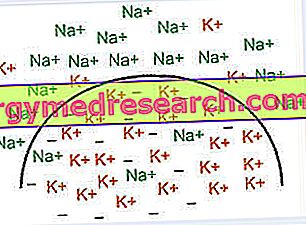ARTILOG ® is a drug based on celecoxib
THERAPEUTIC GROUP: Non-steroidal anti-inflammatory and antirheumatic drugs
IndicationsAction mechanismStudies and clinical effectiveness Usage and dosage instructionsWarnings Pregnancy and lactationInteractionsContraindicationsUndesirable effects
Indications ARTILOG ® Celecoxib
ARTILOG ® is indicated in the symptomatic treatment of joint inflammatory states, present in rheumatic diseases such as osteoarthritis, rheumatoid arthritis and ankylosing spondylitis.
Mechanism of action ARTILOG ® Celecoxib
Numerous studies have allowed us to precisely characterize the molecular events that lead to the synthesis of chemical mediators involved in the genesis of the inflammatory process.
In the chain of reactions that occurs during inflammatory processes, a key role is played by some enzymes known as cyclooxygenases, present in the human organism in various isoforms, and able to catalyze the reaction that guarantees the conversion of arachidonic acid into prostaglandins .
More precisely, it was possible to differentiate Cycloxygenase 1 (COX1), constitutively expressed in all tissues and in particular in the gastro-enteric tissue and able to mediate the synthesis of prostanoids with mucus-protective activity, from the induced Cyclossigenases 2 (COX 2) induced from inflammatory events and involved in the synthesis of chemical mediators endowed with pro-inflammatory, edemigena, pyrogenic and algic activity.
For many years the activity of both isoforms was modulated upstream, in an undifferentiated manner, obtaining both the arrest of the inflammatory processes and an inhibition of the production of chemical mediators with a protective activity against the mucosa, thus associating to the use of non-selective non-steroidal anti-inflammatory drugs an increased risk of adverse reactions on the mucosa.
However, pharmaceutical research has allowed, through a series of chemical modifications to the pyrazoles, to obtain active ingredients, such as celecoxib, which can selectively inhibit COX 2, thus fulfilling an important anti-inflammatory effect without compromising the health of the gastro-enteric mucosa.
However, this selective inhibition has been associated with a greater risk of cardiovascular events, essentially due to the lack of inhibition of the production of TXA2, thromboxane with vasoconstrictor and pro-aggregating activity, although mainly in predisposed patients.
Studies carried out and clinical efficacy
1. THE CELECOXIB IN THE CONTROL OF POST-OPERATIVE PAIN
J Craniofac Surg. 2012 Mar; 23 (2): 526-9.
Preemptive analgesic effect of low doses of celecoxib is superior to low doses of traditional nonsteroidal anti-inflammatory drugs.
Very important study that demonstrates the superior analgesic efficacy of celecoxib in the control of post-operative pain following major surgery, compared to the classic non-steroidal anti-inflammatory drugs.
2 .CELECOXIB AND RADIOTHERAPY
Int J Radiat Oncol Biol Phys. 2012 Mar 13.
Celecoxib Enhances the Radiosensitizing Effect of 7-Hydroxystaurosporine (UCN-01) on Human Lung Cancer Cell Lines.
Interesting experimental work that demonstrates how celecoxib can increase the specificity and efficacy of radiotherapy against human lung cancer cells. This could open the door to new therapeutic approaches reserved for cancer patients.
3. THE CELECOXIB IN THE DISTORTION OF THE ANKLE
J Int Med Res. 2009 Nov-Dec; 37 (6): 1937-51.
Efficacy and safety of celecoxib in the treatment of acute pain two to ankle sprain in a Latin American and Middle Eastern population.
Mexican study that shows how the treatment with 400 mg of celecoxib, in the loading phase, followed by a weekly maintenance of 200 mg may be effective in reducing pain following severe ankle sprain.
Method of use and dosage
ARTILOG ®
Opaque 200 mg capsules of celecoxib.
The effective standard dose for the treatment of inflammatory conditions associated with rheumatic diseases is that of 200 mg of celecoxib divided at two different times of the day.
In particularly serious cases, in which the aforementioned dose is not sufficient to guarantee an appreciable therapeutic effect, the dosage could be increased, under medical indication, to 400 mg daily, always divided into two different doses.
An adjustment of the dosages normally used should be provided for elderly patients or those suffering from liver and kidney diseases.
Warnings ARTILOG ® Celecoxib
In light of the results obtained from numerous studies showing that the incidence and severity of adverse reactions associated with celecoxib is proportional to the dosage used and the duration of therapy, it would be appropriate to take ARTILOG ® at the minimum effective dose and for the shortest possible time.
Particular caution should be recommended for patients suffering from gastro-intestinal, cardiovascular, hepatic and renal diseases due to their increased susceptibility to the side effects typical of selective NSAID therapy.
The same care should be reserved for all those atopic patients, given the significant allergenic power of celecoxib.
If the standard therapy is ineffective or is associated with the appearance of unwanted adverse reactions, the patient should immediately contact his doctor, with whom he may be inclined towards the suspension of therapy.
ARTILOG ® contains lactose, therefore it is not recommended in patients with lactose intolerance, lactase enzyme deficiency or glucose-galactose malabsorption syndrome.
Given the ability of celecoxib to induce dizziness, vertigo and drowsiness, it would be advisable to avoid driving cars or using machinery following the intake of ARTILOG ®.
PREGNANCY AND BREASTFEEDING
Given the absence of significant clinical trials and the potentially toxic effects of celecoxib on fetal health, as observed in numerous experimental studies, the use of ARTILOG ® during pregnancy is contraindicated.
This contraindication also extends to the subsequent breastfeeding period, given the tendency of this active ingredient to accumulate in breast milk.
Interactions
The hepatic metabolism to which celecoxib is subjected, which sees some particularly active cytochromial enzymes as CYP2C9 as protagonists, exposes ARTILOG ® to the risk of relevant drug interactions both for the possible side effects and for the significant therapeutic variations.
Particular attention should therefore be given to the concurrent intake of celecoxib and:
- oral anticoagulants, given the important changes in coagulation homeostasis;
- ACE inhibitors, angiotensin II antagonists, cyclosporin and tacrolimus due to the increase in kidney-bearing capacity;
- Fluconazole and other active ingredients inducers or inhibitors of CYP2C9, due to the unpredictable pharmacokinetic, and therefore therapeutic, variations.
For the same reason it would be appropriate to consider the inhibitory activity of celecoxib against the aforementioned enzyme, involved in the metabolism of other active ingredients such as antidepressants, neuroleptics and antiarrhythmics.
Contraindications ARTILOG ® Celecoxib
The use of ARTILOG ® is contraindicated in case of hypersensitivity to the active ingredient or to one of its excipients, hepatic and renal insufficiency, chronic inflammatory diseases of the intestine, peptic ulcer, congestive heart failure, ischemic heart disease and arteriopathies and vasculopathies both central and peripherals.
Undesirable effects - Side effects
Although the selective inhibitory action of celecoxib allows to drastically reduce the damaging action on the gastro-enteric mucosa, normally described for non-selective non-steroidal anti-inflammatory drugs, the intake of ARTILOG ® is not free from potential side effects.
In fact, sinusitis, urinary tract and respiratory tract infection, insomnia, abdominal pain, flatulence, constipation and diarrhea, flu-like symptoms, hypertension, palpitation, cardiovascular disease, hepatic and nephrotoxicity, allergic reactions are reported. that respiratory.
The severity and frequency of the aforementioned symptoms is inevitably associated with the duration of therapy and the doses of medication used.
Note
ARTILOG ® is a prescription-only drug.



